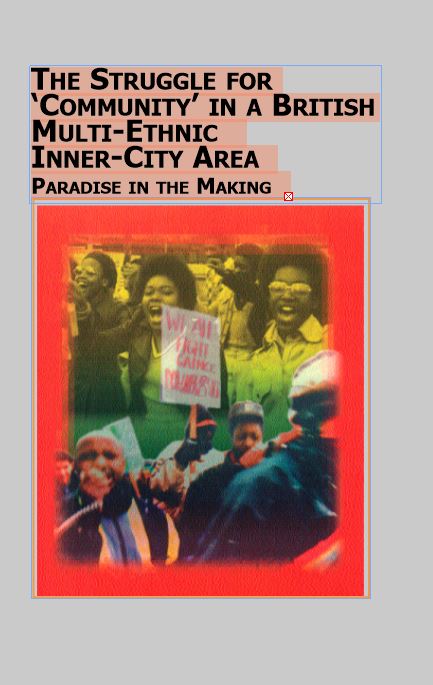STRUGGLE FOR ‘COMMUNITY’ IN A BRITISH MULTI-ETHNIC INNER-CITY AREA
We are currently unable to ship to the EU countries at this time. We apologize for this inconvenience.

| Author: | Farrar, Max | |
| Year: | 2002 | |
| Pages: | 440 | |
| ISBN: | 0-7734-7042-5 978-0-7734-7042-2 | |
| Price: | $259.95 + shipping | |
| (Click the PayPal button to buy) | ||
It is a valuable contribution to current sociological debate, seeking to interrogate and resurrect in a theoretically viable way the concept of community. Theoretically the book advances a distinctive conceptualization of community through a wide-ranging encounter with contemporary debates in sociological theory.
Reviews
“It is a valuable contribution to current sociological debate, seeking to interrogate and resurrect in a theoretically viable way the concept of community. . . . Theoretically the book advances a distinctive conceptualization of community through a wide-ranging encounter with contemporary debates in sociological theory. Empirically the book is highly original and valuable in the long historical sweep of its analysis of the various social movements and political conflicts that have occurred in one inner city area [Chapeltown, Leeds] over a period of thirty years. Together the theoretical and empirical aspects of the study make significant contributions to the sociology of social movements, urban sociology and the sociology of ‘race’ and ethnicity.” – Dr. Paul Bagguley
“This is an important work: refreshing in the author’s obvious commitment to a set of communities that he knows very well; and through-provoking through his reflections on the concept of ‘community’, a concept which is too often taken to be something already understood. In addition, the book celebrates the work of community activists and pioneers over the past quarter of a century – a period which Farrar also documents through his photography of Leeds West Indian Carnival….Farrar’s archive of carnival pictures gives a remarkable insight into a community.” – Community Connections.
“. . . this is a very valuable book, one which deserves to become a classic, with its rich mixture of academic rigour and an ability to provide a uniquely well-informed case study of Chapeltown in Leeds for a long period in time, based on both Max’s personal engagement in community activism and his academic research. I think it makes for a powerful and engaging read. It is one of those rare academic books which I will continue to return to over the years.” – Prof. Graham Haughton
“This is an important work: refreshing in the author’s obvious commitment to a set of communities that he knows very well; and through-provoking through his reflections on the concept of ‘community’, a concept which is too often taken to be something already understood. In addition, the book celebrates the work of community activists and pioneers over the past quarter of a century – a period which Farrar also documents through his photography of Leeds West Indian Carnival….Farrar’s archive of carnival pictures gives a remarkable insight into a community.” – Community Connections.
“. . . this is a very valuable book, one which deserves to become a classic, with its rich mixture of academic rigour and an ability to provide a uniquely well-informed case study of Chapeltown in Leeds for a long period in time, based on both Max’s personal engagement in community activism and his academic research. I think it makes for a powerful and engaging read. It is one of those rare academic books which I will continue to return to over the years.” – Prof. Graham Haughton
Table of Contents
Table of contents (main headings):
Foreword; Preface
1. Introduction
2. Chapeltown: maps and demographics
3. ‘We did not come alive in Britain’: A brief history of migration to Chapeltown (Caribbean, South Asia, East Africa)
4. The concept of community
5. Chapeltown: territory and the social construction of space (early modern settlers; Jewish settlers; Black settlers)
6. Constructing ‘community’: forming social movements, 1972-75
7. Violence and the competing politics of ‘community’, 1975-81 (Reggae and Rastafarianism; Bonfire Night)
8. Segmenting ‘community’ : the decline of the social movements, 1981-97
9. Crime, social relations, and the de-construction of ‘community’
10. Conclusion: constructing and de-constructing ‘community’ in Chapeltown
Appendix; Primary sources and bibliography; Index
Foreword; Preface
1. Introduction
2. Chapeltown: maps and demographics
3. ‘We did not come alive in Britain’: A brief history of migration to Chapeltown (Caribbean, South Asia, East Africa)
4. The concept of community
5. Chapeltown: territory and the social construction of space (early modern settlers; Jewish settlers; Black settlers)
6. Constructing ‘community’: forming social movements, 1972-75
7. Violence and the competing politics of ‘community’, 1975-81 (Reggae and Rastafarianism; Bonfire Night)
8. Segmenting ‘community’ : the decline of the social movements, 1981-97
9. Crime, social relations, and the de-construction of ‘community’
10. Conclusion: constructing and de-constructing ‘community’ in Chapeltown
Appendix; Primary sources and bibliography; Index
